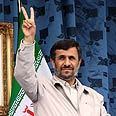
Iran oil sector 'helped' by sanctions, says minister
Iranian Oil Minister Massoud Mirkazemi calls potential threat to country's gasoline imports 'a joke', Vice President Mohammad Reza Rahimi says world needs Iranian energy too much to isolate it
Iran's oil industry has not been dented by sanctions, Oil Minister Massoud Mirkazemi said on Thursday, dismissing a potential threat to the country's vital gasoline imports as "a joke."
Iranian Oil Minister Massoud Mirkazemi attends the 15th International Oil, Gas, Refining & Petrochemical Exhibition in Tehran April 22, 2010.
Mirkazemi's comments, at an energy conference in Tehran, come as the United States pushes for a fourth round of United Nations sanctions to pressure Iran to curb a nuclear program the West fears is aimed at building a bomb.
"Despite all limitations imposed on Iran's oil and gas industry, we have been able to improve," Mirkazemi told delegates. "Imposing sanctions has not isolated Iran but helped the country to improve its oil industry."
The latest draft US sanctions agreed by the United States, Britain, France and Germany include restrictions on new Iranian banks established abroad and on insurance of cargo shipments to and from Iran, the world's fifth-largest crude exporter.
Israel wants tougher measures to block Iran's gasoline imports. Due to under-investment in refineries, Iran has to import some 40% of its gasoline needs.
Asked about the threat of gasoline sanctions, Mirkazemi said: "It's a joke."
'World needs Iranian energy too much'
Echoing Iran's defiance in the face of sanctions, First Vice President Mohammad Reza Rahimi said the world needed Iranian energy too much to isolate it.
"World countries are worried about the procurement of the energy they need and they have no alternative but to negotiate with Iran," Rahimi told the conference.
US and UN sanctions have hindered access to foreign investment and despite having the world's second-largest natural gas reserves Iran has not become a major exporter.
Mirkazemi said Iran needed to invest $200 billion in its oil and gas sector in the period 2010-15.
"In the course of the fifth 5-year plan (2010-15) Iran will have to invest $200 billion in its oil sector of which $125 billion in the upstream sector," he told the conference.
Mirkazemi reiterated that Iran's recoverable oil stood at 138 billion barrels and that its gas reserves were 29 trillion cubic meters.
Traditionally a hawkish member of OPEC, favoring measures to increase the price of crude, Iran sees the level of around $85 - nearly triple the lows seen at the end of 2008 - as "unfair" compared to other energy sources, Mirkazemi said.
Iran's OPEC governor said the oil producers group was unlikely to increase output this year, as there is a reasonable balance between supply and demand.
"It is unlikely that OPEC further increases its output this year," Mohammad Ali Khatibi said. "It is expected that there will be an economic growth (globally) of 3.5 percent which means an increase of up to 1.5 million barrels in demand (per day)."
The International Energy Agency, which advises industrialized economies, has said that oil prices at $85 could endanger the global economic recovery.
Khatibi said any output increases would not happen until 2011 and that such a policy would depend on how the global economy is doing by then.










